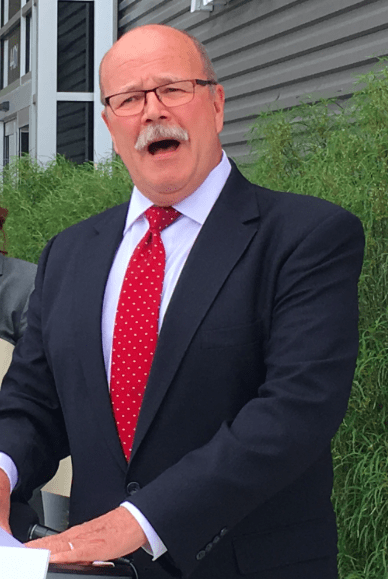INDIANAPOLIS (AP) — A new TV ad attacking Democratic gubernatorial candidate John Gregg labels the former state House speaker a “wasteful-spending, tax-loving, former lobbyist” who did “side work” for the notorious, failed energy company Enron.
But while some claims — notably Gregg’s work as a coal lobbyist — are true, many of the charges leveled in the ad by the Republican Governors Association are debatable, exaggerated or are presented out-of-context.
The ad is airing across the state on Republican Gov. Mike Pence‘s behalf as he faces a difficult re-election and it demonstrates Pence’s increasing comfort with political attacks, which he previously disavowed.
Here is an analysis of the claims made in the ad:
ENRON
The ad narrator ominously intones: “While still being paid thousands by taxpayers, Gregg did side work for scandal-ridden Enron who got a special tax break.”
This statement is mostly true — though it takes some liberties.
In his autobiography “From Sandborn to the Statehouse” Gregg, who is an attorney, writes about local zoning work he did on a southern Indiana power plant project before Enron collapsed in a 2001 accounting fraud scandal.
“I didn’t think anything of it,” he wrote in the 2008 book. “The company — well, you’d recognize the name, it was known as Enron — sadly went into the tank.”
In addition to his work for Enron, Gregg wrote that the company made legal political contributions to him and other lawmakers.
The ad suggests Gregg had a conflict of interest because he worked for Enron while collecting a paycheck as member of Indiana’s part-time Legislature. The practice is common in Indiana. In fact, current House Speaker Brian Bosma, a Republican, has extolled the virtue of citizen legislators having a professional expertise they can bring to the Statehouse.
The ad also claims that the company received “a special tax break” though it does not cite news accounts or public documents to back up the claim. Pence’s campaign referred questions about the ad to the RGA, which did not respond to a request for comment.
The power plant project Gregg worked on was widely supported in Knox County, where local officials rezoned a farm field and approved a property-tax reduction the AP reported in 2000. The abatement wasn’t much different than financial incentives the state currently offers to companies that expand, said Gregg spokesman Jeff Harris.
WASTEFUL SPENDING
The ad states that “Gregg helped turn a massive $2 billion surplus into a massive deficit” while speaker of the House. This is true, but the full picture is a bit more complicated — and bipartisan.
Lawmakers in both parties were in a mood to spend in the late 1990s as the economy boomed and tax revenues surged across the U.S., including Indiana.
Republicans controlled the Senate and argued the surplus should be shrunk with tax breaks. Democrats, who held a slim majority in the House and controlled the governor’s office, agreed but also wanted to spend on social programs, schools and road improvements.
The final bi-partisan spending plan they approved later ballooned with costs-overruns. Then the so-called “Dot.com” bubble burst, the Sept. 11 terrorist attacks happened and the economy foundered.
In his book, Gregg describes a political advantage the tax credits gave House Democrats in the 2000 election, even though the party’s then-Gov. Frank O’Bannon “encouraged us not to” and warned of a troubled economy on the horizon.
“We just couldn’t believe it, but you know what, the Governor was right. We did have an economic downturn,” Gregg wrote. “We were able to win the House, but we didn’t have any money for the next budget.”
HIGHER TAXES
The ad claims “Speaker Gregg also supported higher taxes on Indiana families and businesses.”
This claim is partially true.
The tax increases were passed in 2002 as part of a broader bi-partisan plan that helped backfill the state’s budget in the economic downturn while giving tax relief to property owners who would have seen bills skyrocket due to a court ruling that found Indiana improperly assessed property taxes.
The plan — which hiked gambling, sales and cigarette taxes — was brokered by Gregg and GOP House Minority leader Bosma, even though both leaders voted “No.” The Republican-controlled Senate also singed of on it.
The final deal won Gregg and Bosma an award for their bi-partisanship from Governing Magazine. It also received positive press coverage and was lauded by newspaper editorial boards.
CONFESSIONS OF A NEGATIVE CAMPAIGNER
After several failed bids for Congress in the 1980s, Pence penned an essay in the early 1990s titled “Confessions of a Negative Campaigner” in which he swore off political attacks.
For the most part he’s kept the pledge — until now.
This year’s campaign is expected to be a hard fought rematch against Gregg, whom he narrowly defeated in 2012. Pence has made clear he is going to put up a fight, but what has surprised some is his embrace of political attacks this early in the campaign.
The campaign is keeping the RGA’s work at arms-length, though there is often coordination between the RGA and political candidates.
At his campaign kickoff rally, Pence aimed at Gregg, saying he would let the whole state known about “John Gregg’s record.” And he warned that Gregg would lead to “more deficits, more debt, higher taxes, fewer jobs, more government.”


1 comment
so when are we going to see an article lisitng the boldfaced lies Gregg is telling on his FB posts and ads.